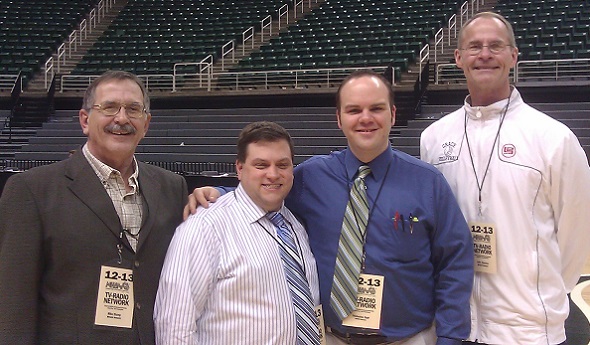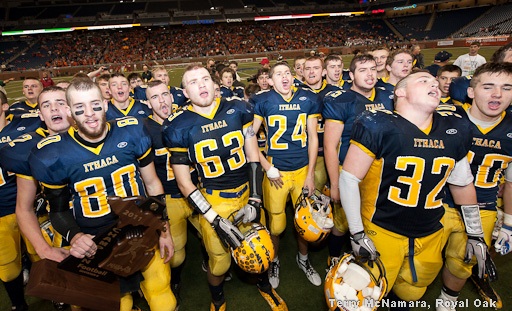
MHSAA Gets Word In During Video Age
September 3, 2014
By Rob Kaminski
MHSAA benchmarks editor
The Buggles’ leadoff single for MTV’s Opening Day on Aug. 1, 1981, started a rally – OK, a revolution – in the music industry that would last decades.
“Video Killed the Radio Star” certainly had a lasting impact, and the song and its one-hit-wonder artist are now an intertwined answer in music trivia lore.
But, the game is still going on. The radio star is far from dead, and, in fact, MTV rarely shows music videos any more.
True, video is everywhere, from laptops to tablets to phones. So, too, is music – and the spoken word in the form of podcasts, audiobooks, and, yes, play-by-play of athletic events.
The MHSAA Network has been providing the latter for prep enthusiasts for decades, entering the world of webcasting around the turn of the millennium.
Having broadcasts available online has done wonders to increase the number of stations and listeners. Prior to the foray into internet broadcasts, dedicated ISDN phone lines and a satellite were required for content to reach the network affiliates.
John Kreger, the primary voice of MHSAA Championships, has been there through the transition, and sees only a bright future ahead.
Prior to the 2003-04 school year, the MHSAA entered a partnership with TBC Sports to air its radio broadcasts for tournaments. Working with TBC owner Will Tieman at that time was Kreger.
“This was before the Network was online, and Will said to me, ‘Hey John, I have a project for you,’” Kreger recalls. “Well, I jumped at the opportunity and he let me run with it. There are times I still want to pinch myself to make sure I’m really able to watch and broadcast all these events.”
After four years with TBC, the MHSAA Network moved its operations to online vendor EZStream, allowing for greater growth and easier access for all involved.
“EZStream really stepped up its quality in recent years, and once our stations no longer needed a satellite receiver, getting games on the air became much simpler,” Kreger said. “All they need to do is point and click to get the feed. It’s a low-cost – almost no-cost – way for stations around the state to tell the story of high school sports.”
No one enjoys telling that story more than Kreger, now in his 11th year calling MHSAA events. His broadcast career has placed him on radio row at Stanley Cup, NBA and MLB playoffs, but it’s talking about his MHSAA Tournament gig that revs his voice to a pitch normally reserved for the final seconds of a prep title game at Ford Field, Breslin or Compuware.
“High school sports is the only pure form of sports left. As a professional reporter and broadcaster I spend most of my year dealing with playing time and sneaker deals,” Kreger said. “But for nine weeks out of the year I get to broadcast sports which the MHSAA has made into a showcase about students, and I am honored to do this. The looks on those kids’ faces when they take the same court or field they see on TV, knowing they reached the pinnacle, there’s no rush like it in sports. I’ll take high school events every day of the week and twice on Sunday.”
The 2008 MHSAA Ice Hockey Final seemed like it might indeed push Kreger into action on a Sunday. The last game of the weekend, the Division 1 tilt between Marquette and Orchard Lake St. Mary’s, went eight overtimes before it was declared a tie. It was one of Kreger’s most memorable moments.
“It was our first year doing hockey on the Network, and being on the air, just being a small part of that, and seeing the MHSAA make the right call and declare a tie; it is something I’ll never forget,” Kreger said. “I’ve been on air enough to hear the cliché, ‘What a great game; too bad someone had to lose,’ too many times, or at times where that might not have been the case. Well, no one deserved to lose that night, and the MHSAA made a great decision. I’m proud to have seen that.”
Thanks to Kreger and the Network, thousands of people continue to “see” games they can’t attend. For the 2014 winter season, approximately 7,000 unique listeners tuned in to the MHSAA Ice Hockey, Girls Basketball and Boys Basketball Finals.
Audio continues to thrive and serve its audiences for a number of reasons.
“Personally, one of the reasons I stay with audio is because we have the opportunity to tell a story and allow the listener to create their own picture,” Kreger said. “Radio broadcasts are much more descriptive, whereas TV broadcasts serve more as guides to what people are already seeing.
“One of my idols is Ernie Harwell, who said, ‘In radio, nothing happens until the broadcaster says it does.’ In that respect, there’s more anticipation and imagination for the listener. Think of the iconic moments like the Bobby Thompson home run. It’s always the radio feed. It takes people back to where they were at the moment.”
That’s another key advantage to audio. If people can’t attend an event, they can listen. Even in today’s world of hand-held video devices, there are times when listening is simply more conducive than watching, whether working around the house, exercising or driving to and from appointments.
“Radio is a lot more accessible to people. It’s a constant companion, and that’s the beauty of it,” Kreger said.
Like its video brethren, audio listeners are turning to mobile devices as the tool of choice. Of the 7,000 customers this past winter, nearly one-third were mobile listeners.
Kreger has been an amiable companion for Michigan prep enthusiasts for the past decade, and he hopes they keep inviting him along wherever their travels take them. He also lauds the MHSAA for expanding its menu.
“The MHSAA is to be commended for expanding the schedule to more than just football and basketball,” Kreger said. “The more sports we can bring to people, the better.”
If Kreger could be in two places at once, there’s no doubt he’d accept the assignment as long as it had the MHSAA stamp on it. Perhaps that’s because his values and perspective are so closely aligned with the mission of school sports and the MHSAA.
“The first rule of high school sports is that this isn’t life. It’s part of life,” he said. “The athletes will become doctors, lawyers and teachers. The coaches are teachers, doctors and auto workers. We don’t sugar coat. I try to be true to the game, to be honest and accurate, and all the while I remember perspective. Above all else, I try to remain respectful of the game.”
PHOTO: The faces behind some of the familiar voices on the MHSAA Network are, from left, Mike Stump, John Kreger, Denny Kapp and John Spooner.

Division 6 Final: Play it Again, Yellowjackets
November 29, 2011
DETROIT – So began the legacy of Ithaca quarterback Travis Smith.
And so continues an incredible run by one of Michigan’s newest football powerhouses.
The Yellowjackets pushed their winning streak to 28 and claimed their second straight MHSAA championship by downing Constantine 42-14 in Friday's Division 6 Final.
They did so led by a number of last season’s top players, but minus their 2010 Final star. That’s where the sophomore Smith came in, joining the starting lineup in the season’s second week and bringing Ithaca back to Ford Field for another title.
“It’s more special just because this is the last time to suit up for most of us. We’re not going to be able to play another game next year, and we get to end on the biggest stage high school football has to offer in Michigan,” Ithaca senior linebacker/running back Garrett Miniard said.
“I think it was almost a little jealousy of the seniors last year of being able do that, being able to go out on top. I think that kept us going throughout the season, throughout the offseason. Being able to have that luxury of going out on top just like they did.
Ithaca (14-0) hasn’t lost since its 2009 Semifinal against Montague. With two more wins to start next fall, the Yellowjackets can become the 14th team on the MHSAA record book list with at least 30 straight victories.
And Smith should be there to lead the way. He connected on 18 of 25 passes for 299 yards and a touchdown Friday, and ran for 43 yards and a score. Miniard rushed for 43 yards and two touchdowns, and had 14 tackles. And senior David Brown caught six passes for 122 yards and also ran for a score.
Smith followed the path this fall of another former sophomore starter at his position – Alex Niznak, who graduated in the spring, plays at Central Michigan now, but didn’t leave before leading the Yellowjackets to both their first Semifinal berth and MHSAA championship over the last two seasons. Niznak’s title game performance last season included 251 yards passing, 138 rushing and an MHSAA Finals-record five touchdowns running the ball.
Brown originally took over at quarterback this fall. But he was injured on opening night – after running for three touchdowns against Williamston – and missed significant time, allowing Smith to take hold of the offense. Smith finished his first varsity season with a not-too-shabby 2,310 passing yards, 969 rushing yards, and a combined 48 touchdowns throwing or running.
“Coach (Terry) Hessbrook told me to just go in there and do what I can do, and just play football,” Smith said. “I’ve got so many good athletes around me. I just need to get my players the ball and let them do what they can do.”
Ithaca twice had catching up to do in the Final, with Constantine (11-3) scoring first and then taking a 14-7 lead midway through the first quarter – before the Yellowjackets rolled to 35 unanswered points.
“These kids had this goal since last year … of getting back here,” Hessbrook said. “We didn’t want Ithaca football to just be one and done, or a one-year wonder. And they’ve worked really hard.”
Constantine junior Ben Mallo did run 17 times for 189 yards and both scores. But the Falcons were without quarterback Tommy Reed, who was injured during last week’s Semifinal win over Ecorse. They played Ithaca to a 14-14 halftime tie before the Yellowjackets’ offense broke the game open.
“We’ve played offenses with that type of talent. Last week, for instance. And I’m sure Coach Hessbrook watched those films and saw some things he could do against us," Constantine coach Shawn Griffith said. "It’s a lot different than what we do, and you saw we caused them a little bit of problems early in the game as well. We do our thing, they do theirs. They do their thing very well. We did ours well. We just weren’t quite there on a couple drives that ended short.”

